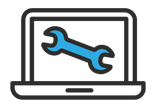What Personal Storage Should I Buy? A Buyer’s Guide
Types of Personal Storage
When it comes to personal storage, there are several options available, each suited to different needs and preferences. Here, we’ll explore the most common types of storage solutions:
- External Hard Drives (HDDs)
- Solid State Drives (SSDs)
- Network Attached Storage (NAS)
- USB Flash Drives
- Cloud Storage
External Hard Drives (HDDs)
External hard drives are a popular choice for personal storage due to their affordability and high storage capacities. They connect to your computer via USB, making them easy to use and versatile.
Pros:
- High storage capacity (up to several terabytes)
- Cost-effective
- Easy to use and portable
Cons:
- Slower read/write speeds compared to SSDs
- Susceptible to physical damage if dropped
- Can be bulky
Recommendation:
For users needing large storage at an affordable price, the WD My Passport series offers excellent value. It provides ample storage space and reliable performance for backing up files, storing media, and more.
Solid State Drives (SSDs)
Solid State Drives offer faster performance compared to traditional HDDs. They are more durable and energy-efficient, making them ideal for users who require quick access to their data.
Pros:
- Faster read/write speeds
- More durable (no moving parts)
- Lightweight and portable
Cons:
- Higher cost per gigabyte compared to HDDs
- Typically lower storage capacities
Recommendation:
The Samsung T5 Portable SSD is a top choice for those seeking speed and durability. It offers fast transfer rates and a compact design, making it perfect for on-the-go use.
Network Attached Storage (NAS)
Network Attached Storage devices are essentially personal cloud servers that connect to your home network. They allow multiple users to access and share files over the network, making them ideal for households or small offices.
Pros:
- Centralised storage accessible by multiple devices
- High storage capacities
- Advanced features like automatic backups and media streaming
Cons:
- More expensive than single external drives
- Requires some technical knowledge to set up
- Dependent on network performance
Recommendation:
For those needing robust, networked storage, the Synology DiskStation DS220+ is an excellent choice. It offers high performance, a user-friendly interface, and extensive features like RAID configurations and cloud integration.
USB Flash Drives
USB flash drives are highly portable and convenient for transferring files between devices. They come in various capacities and are easy to carry around.
Pros:
- Extremely portable
- Easy to use
- No external power required
Cons:
- Limited storage capacity compared to HDDs and SSDs
- Easier to lose due to small size
- Slower transfer speeds for lower-end models
Recommendation:
The SanDisk Ultra Flair USB 3.0 offers a good balance of speed, capacity, and affordability. It’s ideal for transferring files quickly and easily.
Cloud Storage
Cloud storage services allow you to store and access your files online. This option is highly convenient as it enables access from anywhere with an internet connection and offers automatic backups.
Pros:
- Access your files from anywhere
- Automatic backups and sync across devices
- Scalable storage options
Cons:
- Requires a reliable internet connection
- Ongoing subscription costs
- Privacy and security concerns
Recommendation:
For those looking for a reliable cloud storage solution, Google Drive is a great option. It integrates seamlessly with other Google services, offers generous free storage, and provides competitive pricing for additional storage.
Choosing the Right Storage Solution
When selecting personal storage, consider the following factors to determine the best option for your needs:
Capacity: Determine how much storage space you need. HDDs and NAS devices offer the highest capacities, while USB flash drives and SSDs are more limited.
Speed: If you require fast access to your files, an SSD or a high-speed USB flash drive is preferable. HDDs and cloud storage are slower in comparison.
Portability: For on-the-go use, USB flash drives and portable SSDs are ideal due to their compact size and durability.
Budget: HDDs provide the most cost-effective storage, while SSDs and NAS devices are more expensive. Cloud storage requires ongoing subscription fees.
Use Case: Consider how you’ll use the storage. NAS devices are great for shared access in a home or office, while external HDDs and SSDs are perfect for individual use. USB flash drives are best for quick file transfers, and cloud storage is ideal for remote access and backups.
Final Thoughts
Choosing the right personal storage solution depends on your specific needs and preferences. By considering factors like capacity, speed, portability, budget, and use case, you can find the storage option that best suits your requirements.
Techfident offers a comprehensive range of solutions for both remote support and remote desktop needs. Whether you’re seeking technical assistance or seamless remote access, we have the right tools and expertise. If you’re in desperate need of IT Support, get in contact with us now.
Leave your details, and we will call you.
Take a look at our services
Get in touch.
We’d love to hear from you.
Give us a call, send an email or drop us a note and we’ll call you back.

